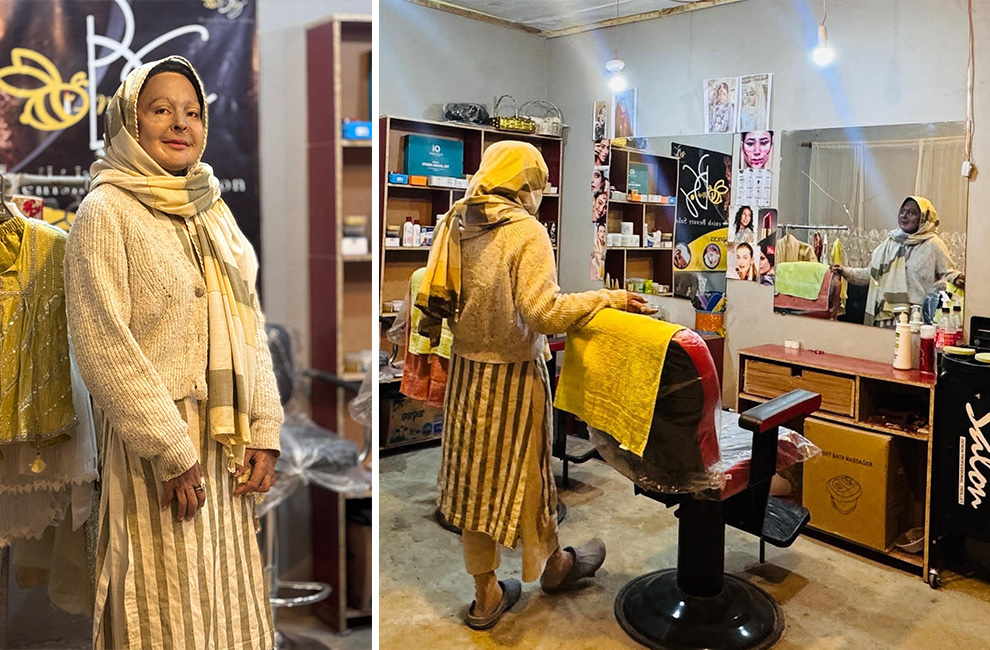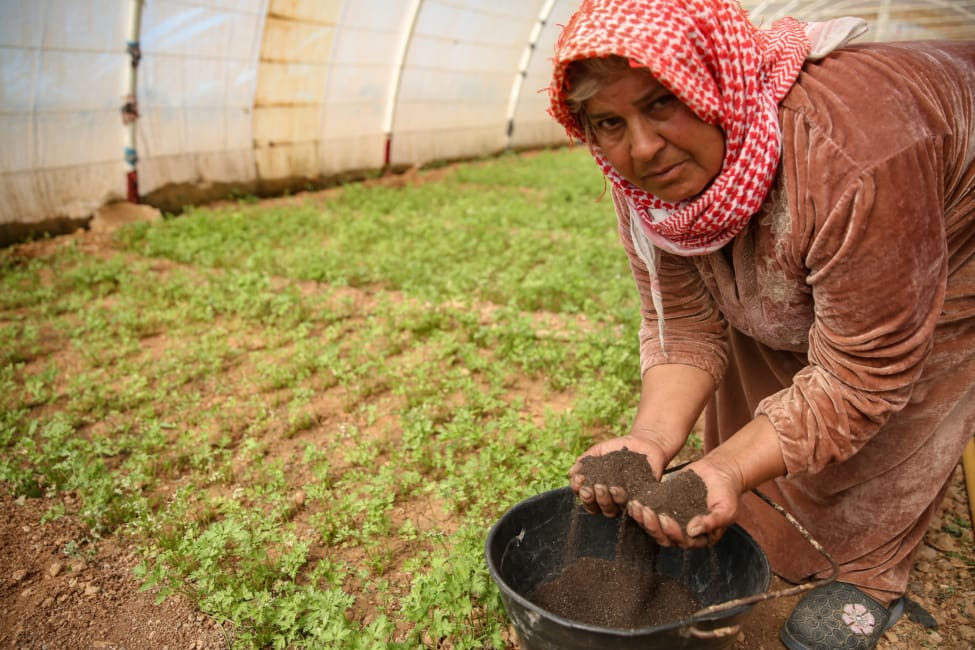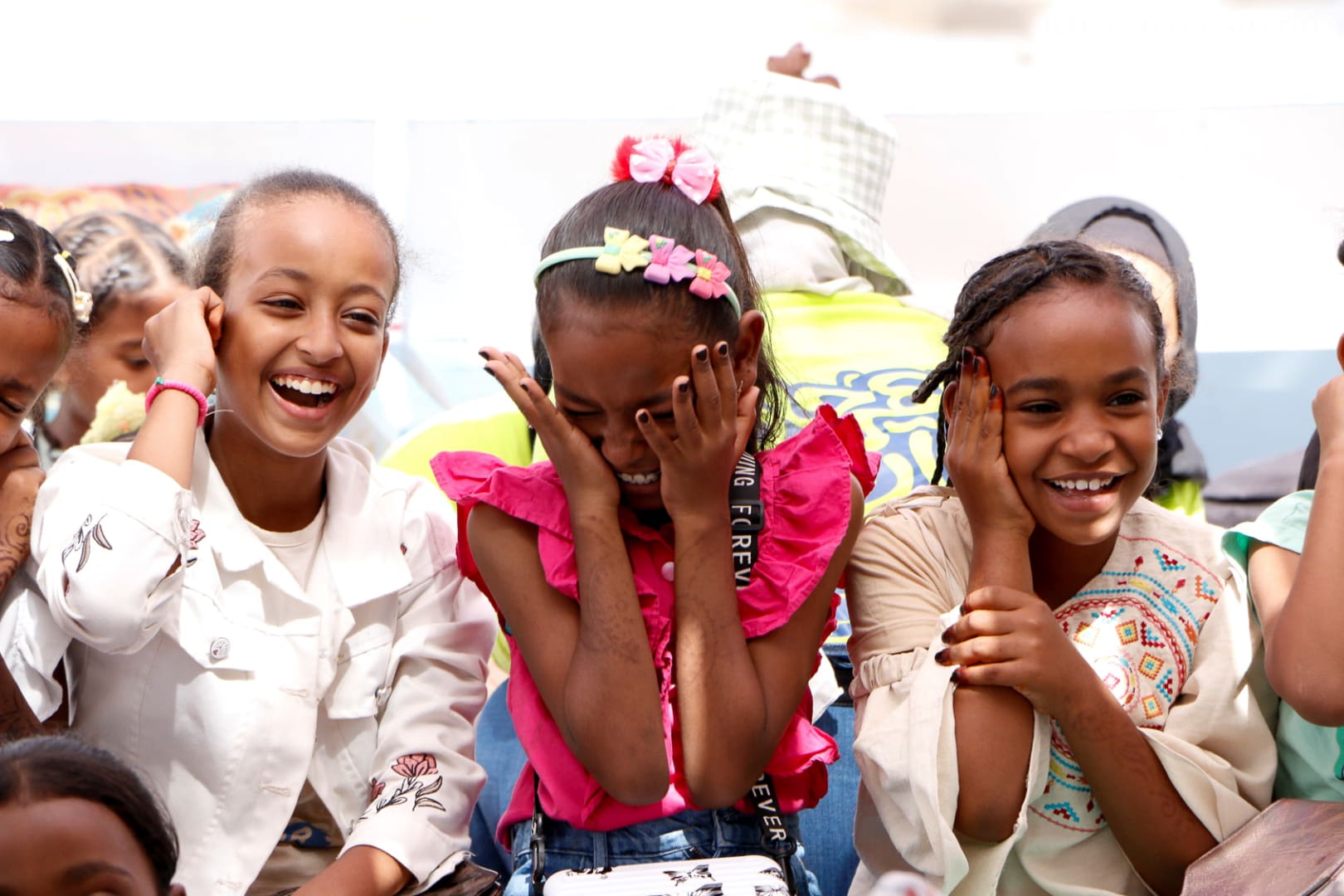The month in pictures: May
Supporting Sudanese children in Egypt, producing quality olive oil in Syria, and playful learning in Tanzania: see what we’ve been up to this month.


Three young girls enjoy a moment of laughter at the Arty Narty Festival, where Sudanese and Egyptian children took part in creative workshops, like fashion design, clay, modelling, and acting. The event welcomed children from all backgrounds, providing a platform for creativity and collaboration. Since April 2023, Egypt has welcomed over 748,000 refugees and asylum-seekers, the majority of whom are women and children fleeing the conflict in Sudan. This festival is part of efforts by the Om Habibeh Foundation (OHF) to provide education for Sudanese children in Aswan, funded by UNICEF. The programme supports the integration and educational development of these children, enabling them to build skills and access opportunities to thrive in their new communities.
In Egypt, AKF works alongside OHF to lead a range of integrated, innovative, and gender sensitive programmes in Aswan governorate.
Location: Aswan, Egypt / Photographer: Rahma Elamin

At five years old, Beenish Maryam survived a gas explosion at her home, which claimed the lives of her parents and younger sister. Despite experiencing such tragedy at a young age, Maryam has always approached life with resilience and purpose. After completing her education and professional beauty certifications, she has recently opened her own beauty salon with support from the Aga Khan Rural Support Programme (AKRSP). Through AKRSP’s support, Maryam accessed business training and a microgrant, enabling her to turn her passion into a thriving business and achieve financial independence. By helping women feel beautiful and self-assured, Beenish is also shattering beauty myths and redefining confidence on her own terms.
AKRSP has trained more than 3,752 aspiring entrepreneurs, provided advanced training to 1,949 individuals, and awarded microgrants to 624 promising business ideas like that of Maryam across Gilgit-Baltistan and Chitral.
Location: Gilgit-Baltistan, Pakistan / Photo credit: Beenish Maryam

In the village of Al-Muzeraa, an AKF staff member leads a hands-on training session with 25 local farmers, demonstrating innovative grafting techniques. The session equips farmers with the knowledge to graft olive trees with drought-tolerant and disease-resistant varieties. By improving the yield and quality of olive oil, this training is helping farmers build sustainable practices that will not only protect their crops but also enhance their income and quality of life in the years to come.
Location: Hama, Syria / Photographer: Ali Shaheen

Laughter, imagination, and learning in action. At an Anganwadi (early childhood development centre) children dive into the world of free play, joyfully and creatively crafting their own stories. Free play refers to unstructured, child-initiated play where children choose what to play, without direct guidance or predetermined outcomes. Free play is essential for a child’s physical, emotional, cognitive, and social development. Here, the children are playing ‘doctor-doctor’, where one pretends to be the doctor while examining another as the patient. Children are leading the play, exploring, and solving problems on their own – with the focus firmly on fun, not results.
Location: Uttar Pradesh, India / Photographer: Rekha Waskel

On the 20th May 2025, AKF partnered with the Tanzania Institute of Education (TIE) to plant two micro-forests within the TIE compound. With the support of staff, volunteers, and leadership in a collaborative, hands-on effort to promote sustainability, they planted 400 tree seedlings across the two forests.
Through our micro-forest initiative (known as GROW), AKF is taking a practical step towards integrating climate action into everyday workspaces, aiming to support local institutions, promote sustainable practices, and create green learning spaces.
Location: Dar es Salaam, Tanzania / Photographer: Linh Nguyen

During an Explosive Ordnance Risk Education (EORE) session, Syrian communities learn about unexploded ordnance (UXOs) and improvised explosive devices (IEDs). Years of conflict in Syria have left many rural and former front-line areas contaminated with these hidden hazards, putting civilians—especially farmers, children, and returnees—at significant risk and preventing communities from safely accessing agricultural land, schools, and other vital infrastructure. The EORE sessions educate communities on how to identify explosive hazards, take safety precautions, and report dangerous items to authorities.
The sessions are facilitated by AKF in collaboration with local partners like the Syrian Civil Defense, and funded by the German Development Bank (KfW).
Location: Hama, Syria / Photographer: Ali Shaheen

Hamidov Bahriddin is a resident of Darai Bohtur village, where he now enjoys access to safe drinking water from a water point located right in front of his home. Before, there was no water system in Hamidov’s remote community; they fetched drinking water from open, unprotected source and carried it long distances by hand or with donkeys. The newly established drinking water network includes 75 water points and 17 bathrooms, improving access to clean water and sanitation for the entire community.
This initiative, led by AKF, is funded by the Government of Switzerland.
Location: Khatlon, Tajikistan / Photographer: Sharofat Shafieva

A farmer holds the rich, dark soil of her organic compost in the greenhouse she tends. With AKF’s support, Syrian farmers are producing organic fertilisers, such as vermicompost (compost made through the breakdown of organic matter by worms), as an alternative to traditional chemical fertilisers. This practice improves soil health, enhances water retention, and supports sustainable farming practices that benefit both the environment and the crops grown within these greenhouses.
Location: Hama, Syria / Photographer: Ali Shaheen

Evalina Leskare Sabayo is a pre-primary teacher at Chienjele Primary School. Here, she demonstrates some of the low-cost teaching materials she has developed to enhance playful learning in her classroom. Evalina uses locally sourced materials to upcycle and create toys and other items that can transform lessons into joyful, creative experiences. In the ‘play corner’ of her classroom, Evalina helps students with numeracy through counting and simple maths exercises using the materials she has made.
Location: Lindi, Tanzania / Photographer: Peter Steele
/9

Support our work Your donations are helping us build a future where we all thrive together.